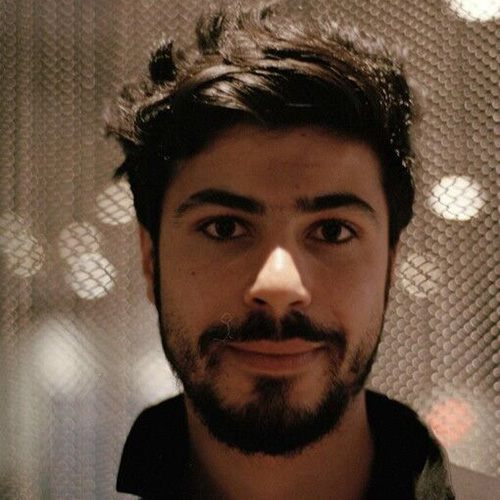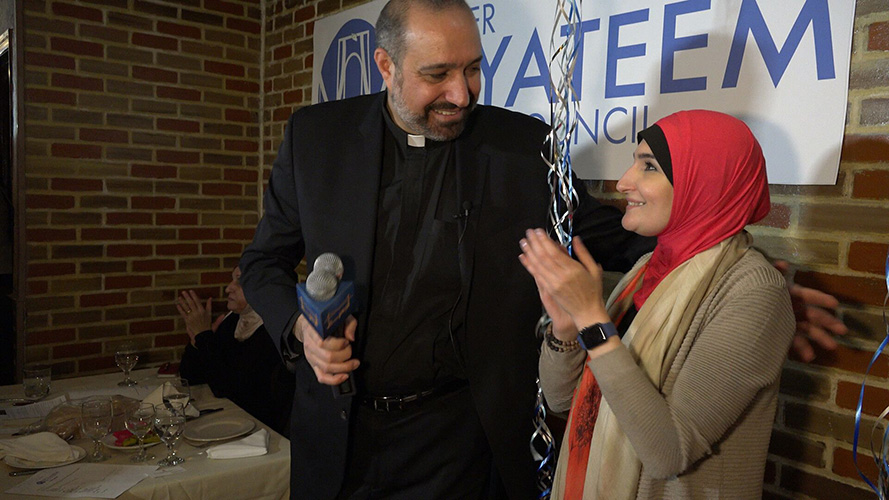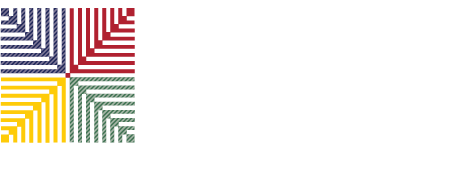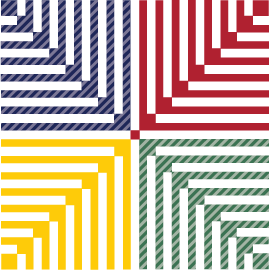

Brooklyn, Inshallah chronicles the political campaign of the charismatic Palestinian Lutheran Pastor, Father Khader El-Yateem (“Father K”), who ran in the Democratic Primary for NY City Council in District 43 in 2017 as the first-ever Arab candidate. District 43 spans four neighborhoods including Bay Ridge, where many Arabs live. Ahmed Mansour, Palestinian filmmaker newly arrived from Gaza, told us how he stumbled upon this story and what its impact was, both on him personally and on the neighborhoods and communities where Father K campaigned.


BPFF: How were you able to leave Gaza and come to the US to study? It’s rare.
AM: It is. I was very fortunate to leave Gaza. It took me three years to get the permission from the Israelis to leave. I got three undergraduate scholarships to come to the US to Indiana University, but I lost all of them because of the siege on Gaza (closed border) and the wars. Those scholarships were mainly in the summer, and in Gaza we expect the Israelis to bomb Gaza during the summers, so I lost all the scholarships. In August 2015, I came on a literature program in NY. I contacted Gisha “Access” in Hebrew), a legal center in Israel that lobbies for students to be able to get Israeli permission to leave Gaza. They made it happen, and I was so grateful.
I came to the US and attended the leadership program “Paths to Peace.” If you want to leave Gaza, all you worry about is to get the opportunity without looking into it much. You don’t question it. When you are in Gaza, you only think how are you going to make it out, not where are you going or what the opportunity really is.
BPFF: Your whole family is still in Gaza, right? You are the only one here?
AM: Yes. I have 5 sisters, 2 brothers, and 10 nieces and nephews, and my parents. Half of them I have never met, because they were born when I was here. They are growing up away from their uncle. I know them only on the screen [through Skype]. Kids grow up fast, so it’s frustrating and sad.
BPFF: So you are unable to go back, right?
AM: When I came here, I started telling my story on campuses and in churches and centers. My father is the Vice Chairman of Gaza University, where I did my undergraduate degree. He goes to Ramallah often. In 2016, my father came here to the US on a State Department program. Of course I saw him. When he went back, the Israelis interrogated him about me and told him details like what drinks I like and where I hang out. My father got very concerned and told me, “There is no way you can return to Gaza through Israel again, only through Egypt.” However, the regulations require that if you left Gaza through the crossing point on the Israel border, you must re-enter through Israel [and that same crossing point]. And the same applies to the other crossing point on the Egyptian border [that takes you out through Egypt]. That’s why I really could not even try to re-enter Gaza through Israel, because they interrogated my father, and he warned me not even to try.
So… the price of telling your story peacefully is that your family gets interrogated. I had no idea about that—I did not go radical in any way; I’m just normal. I am only telling stories—like stories from the war in 2014 and wars in general. It seems that telling your own story can put you in jeopardy with the Israelis. They don’t know that this only makes us more determined.
BPFF: How did you first stumble on this story? And then how did you decide to make a film?
AM: It’s a long story. You need to be patient to hear it. When I was in middle school, AMIDEAST has this Access scholarship, which is like two years, and it takes the smartest students from the UNRWA schools and gives them two years of learning American English and American values, history, and civil rights. Martin Luther, Kennedy, and King. So I had that about America in my mind—as would any guy in the Middle East—this is what we know about America, the land of freedom and opportunity. This is all I knew about America.
When I came to the US in August 2015, the presidential candidates had started campaigning and rallying. If you remember, one of Trump’s early crazy promises was the travel ban. So I arrived here and he was saying this stuff, and I experienced a deep cultural shock. Where have I come to?
So then I started my Master’s in September 2016, and the election was in November, and Trump won. Of course, I was depressed as any good American with a good conscience would be. I didn’t know what to do. I thought I would be deported. Like any Arab or Muslim in this country, we were all freaking out. What’s going to happen? Is he going to put us in concentration camps? I had this fear because I was still new to the country. I don’t know the politics. All I knew were the American values I had expected to find when I arrived here.
Out of despair, for Trump’s inauguration, I decided to come from NY and cover it. I thought in desperation, “If I am going to get deported, I want to at least be in this historical moment.” I truly thought deportation was right around the corner. I had applied for asylum right before then, and that is why the fear gripped me. I was a recent asylee; my papers were still processing. I had no idea what would happen. Trump of course was threatening that he was going to stop everything, even asylum, even green card holders, and the travel ban and all that.
I came down to DC. I started filming and interviewed over 100 people. I had no story; I was just documenting as a documentarian. To get a feel of the people there and understand why they were supporting him. To meet these Americans who really thought he was the best guy for this country.
I heard there was a riot on K Street and people were protesting. I went there and started filming—people started burning tires, smashing car windows. I was with guys from Vice News and ABC News; we were all filming, and I had my NYU press badge on. Then security forces—not police but something more like military, wearing super gear that I have never seen in my life, even in Israel—came, in military vans and helicopters. It started to get familiar, if you know what I am saying.
I kept filming, of course. If you come from Gaza—from my upbringing and what I used to live through—you cannot back off. You just keep filming. Then around 10 security officers surrounded me, although I was carrying my camera and my press badge, and all together they pepper-sprayed and tear-gassed me. I fell to the ground unconscious for at least two hours. Then the Red Cross came. Even when I was unconscious, they were firing it while I was on the ground. The camera fell, of course. I came to and I was like “What on earth just happened?”
The first thing I did was to call my professor, my mentor. She is Jewish, and I love her. She said, “Why are you mad? They just wanted to let you feel at home.” Then I started taking it sarcastically. I never ever thought to leave Gaza where I was tear-gassed so many times and come to the capital of the free world and get tear-gassed in the heart of Washington DC.
I didn’t know what to do. It was so hard to process. Then I insisted. This is the outrage in a Gazan. Next day at the Women’s March, I kept on filming. Because if you are a Palestinian growing up in Gaza, one thing you have in you is that they can never kill your spirit. They might tear-gas you, bomb you, kill your family, cut your limbs—but we just keep moving.
The next day I, woke up super early and went to film the Women’s March, and then I heard a speech that really affected me. I could not get near the stage because there were tons of people—a lot more than at the Inauguration, maybe twice as many. I saw it first hand. But this woman’s voice was ringing to me. She was really expressing my frustration. I did my research on the spot and found her name: Linda Sarsour. I learned that she lives in Brooklyn. I thought, “OK I think I am going to channel my anger through her, through her work.”
I returned home to Brooklyn. I tried to get access to her, but she was super busy. She started getting so many attacks and hate mail messages after the Women’s March, because she became so prominent at the march. It was really hard to get access to her. But in the end, I got it. This is the other thing about being from Gaza—the resilience in you. “No” means “yes.” She said “No” repeatedly. But I kept filming with her and calling her. Just to document—because she was so busy—protests, speaking, and I love her as a public speaker.
I kept filming, until one day she was in Bay Ridge at a restaurant introducing this man who was a Palestinian Lutheran Pastor to be the first one to run for NY City Council. So I was like, that’s interesting. I kept filming with him and Linda, and it all started from there. Then I decided to tell the story of the campaign. And then I started to get to know all about Bay Ridge.
BPFF: You had the luck to be there at the first moment of his campaign.
AM: Yes it was by luck.
BPFF: Not only luck.
AM: Intuition.
BPFF: As you experienced this campaign and the film, what were the big takeaways about what he achieved and the overall significance to the community? What was the impact of the campaign?
AM: After I filmed his campaign launch, I was like, what makes it interesting? It’s only a City Council—baladiyyeh in Arabic—who cares? But then I learned something that until now I cannot get over: There are 40,000 Arab Americans living in Bay Ridge. Out of 40,000 only 250 voted in the last election. Can you imagine that? I could not believe it. Here’s the thing: As a Palestinian coming from Palestine, from Gaza, we fight so hard and pay with our lives, our blood to have our freedom, to be able to have own state where we can to vote to elect our representatives. And I come here where you can be part of the system and you can really participate in electing your representatives, and find that Americans are just not taking part in that!? How careless is that from my fellow Arab Americans?
So I started asking questions. As a filmmaker, you approach any story not knowing what you are getting in to—you have questions. I went to Bay Ridge and just talked to people, not even filming, and asked them, “Why? How? Please explain.”
What I learned is that what was done to Bay Ridge after 9/11 is insane. Almost every house was raided by the FBI and the IRS. Bay Ridge was the hardest hit community of deportation after 911. Surveillance—the demographic unit, the secret illegal NYPD unit called the demographic unit—it was only there to spy on the residents of Bay Ridge. Almost every store, every mosque had undercover police officers, hidden cameras, recorders. This is what the Associated Press was able to expose in 2011, and the community sued the NYPD, and the NYPD apologized and dismantled the unit. Given all that and much more, how do you want people to participate in the democratic process? I asked this question to a lot of people in Bay Ridge, and they told me that “the reason we don’t vote is that we don’t want our information in any of the government documents. Because they are scared.
Then I was like—aha, it is not a campaign film. That is the arc, the campaign, but through the campaign we get to see why this is so important. What is behind it? What is beneath the surface? I was very fortunate to have a third character. So I have Father Khader al-Yateem, the candidate and main character; Linda Sarsour, main character; and the third main character, Abeer, a volunteer for the campaign. Her father was deported. So we get to know a lot of the backstory through the destruction of her family.
Abeer’s story exemplified what happened to the community. When she was a child, her father was arrested for three years and then deported. Her family was destroyed. It was the most heartbreaking – As someone coming from Gaza, I cannot believe this happened. Whenever I hear something terrifying like this, Abeer, Linda, and Father K tell me, “You grew up in Gaza. Our problems are nothing compared to yours.” But I was like, no! No! Because we are under military occupation, we do not expect the occupiers to be nice people. But if you are here in this country that sings the valuesof freedom and democracy and you still have this happening, that is I think more outrageous than if you are under military occupation where you don’t expect fair treatment. But here, it is subtle, hidden, sneaky. They get around it; it’s complicated.
It was so hard to tell the story. This was my first feature film. I did not choose to step into it. I had no idea. The story kept taking me to another story and another one: Trump, Inauguration, Women’s March, Linda, Father K, the campaign, Abeer, Bay Ridge, surveillance, 9/11, the Muslim Ban, NYC politics, the other rival candidate who was the mayor’s boy, and how the mayor pressured the unions to not endorse Father K. So I stepped into this huge minefield that I had no idea existed.
And it was so hard to tell it. I worked full time on it for three and a half years. I had nothing to do except work on the film. But now the film is going to screen in Doc NYC. I am humbled. I really cannot wait to see what New Yorkers see in the film. There are a lot of sub-issues. I want to see the how the people of Bay Ridge will react to it, and other New Yorkers. It will screen on November 9 at 4:30.
BPFF: It’s fascinating how you describe this. You came from Gaza to the Land of Opportunity and you found yourself in the twilight zone—in another time, another land. But hopefully at the end of the arc, there was some return to hope. It sounds like you did eventually discover the America that you thought was here. Is that true?
AM: Yes, absolutely. Every time the film screens and people react and ask questions—they blow my mind. Because if you make a film you are too embedded in it; you know it by heart. Once it is on the big screen, it is no longer yours. It is an art piece in its own right, and everyone sees it differently. A lot of people have seen in [my film] as being about voter suppression. A lot of people have seen it as—and this is something that I did not articulate until they expressed it—this is a pure American story. How? America and the US is a democracy. But it is not an easy democracy. You have to fight to be part of it. When we look at the Italian American community when they arrived, they really worked hard to get their voice heard and get a seat at the table. When the Jews came, they too had to fight, to organize, and mobilize and unite their community together. And the Irish—They fought so hard to be a part of the American democracy. This is just an affirmation of another community that is joining the American democracy later, learning to assert their rights, to navigate the system to be part of it. And how are you going to fight? If you do not organize your community, you are finished; you will be suppressed. So a lot of people see that this is an American story, and it took someone coming from Gaza to tell it.
The last scene is about Election Day. There were no Arabic signs at the polls. In Bay Ridge, a lot of immigrants still are learning English. So a lot of people—over 500 in fact—who did not speak English were turned away. And, Father Khader lost by that exact number, around 500. He needed 4,000 to win. He lost to the establishment candidate, Justin Brannan, by that number who was turned away at the polls.
After the campaign, the community was able to establish the first political organization called ‘Yalla Brooklyn.’ This is the impact. The story starts with 250 out of 40,0000 who are registered voters. By the end, you have at least 3,000 Arab Americans are registered Arab voters and they voted. Now the community established this organization to continue the fight. And then they were able—now for the pure impact thing of this campaign—to lobby city hall to get them to pass a bill that declares Arabic language as an official language in all five boroughs, not only Brooklyn or Bay Ridge.
So this is America. It is not an easy place—you have to fight for your rights. As I started this story, I wondered which America I had stepped into. It’s still an open question; there’s no answer. But America is changing. America is what you work for. If you put in the work, it will become the America you want to live in. Now you have over maybe 10,000—I have to update the number—but at least 5,000 Arabs are registered legitimate voters in Bay Ridge. So now for the next election, an Arab person is going to win. That is what the campaign accomplished.
BPFF: Will you do another film about the next election?
AM: No, I’m done. I’m moving on.
BPFF: What do you hope to do next?
I am working on a documentary short about a family from Gaza that who got separated between Gaza and the US. The husband came to the US to do a Master’s. He is a trauma specialist who used to heal Gaza kids. When he finished his degree in 2014 and wanted to head back, the war started, and Gaza was sealed off. He applied for asylum here, leaving a newly married wife and two newly born kids in Gaza. The film is about the journey of this husband bringing them here. This is my next short.
BPFF: Congratulations, that sounds really interesting. Thanks so much for sharing your story with us today. Good luck with the film!
Brooklyn Inshallah screens Tuesday, October 22, 2019 at 7 pm at the Paramount Center at Emerson College. Ahmed Mansour and Producer Paul Costello will be in conversation following the film.
Free and open to the public. Co-presented with the Bright Lights Film Series.
View the full festival schedule and buy tickets here.

